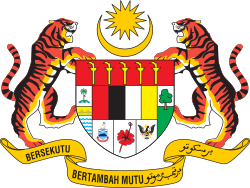Sabah Chinese Association | |
|---|---|
 | |
| Malay name | Persatuan Cina Sabah ڤرساتوان چينا سابه |
| Chinese name | 沙巴華人公會 沙巴华人公会 Shābā huárén gōnghuì |
| Abbreviation | SCA |
| Founders | Khoo Siak Chew, Peter Chin |
| Founded | October 1962 |
| Merger of | United Party and Democratic Party |
| Headquarters | Kota Kinabalu, Sabah |
| National affiliation | Sabah Alliance (1962–1976) Barisan Nasional (1973–1975) |
 |
|---|
The Sabah Chinese Association (Malay : Persatuan Cina Sabah, SCA) was a Chinese political party in the North Borneo and the Sabah state of Malaysia.